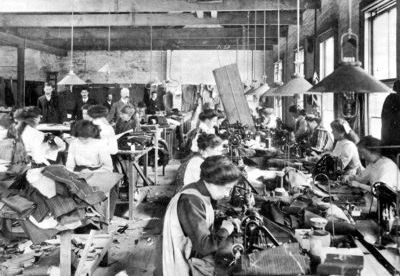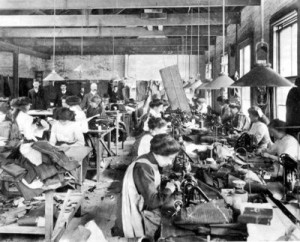Trans-Pacific Partnership a Potential Disaster for American Workers

 Marx and Engels anticipated globalization. One hundred and sixty-five years later, capital has risen to the firmament where it can move instantaneously, unencumbered by states or social contracts. The Trans-Pacific Partnership (TPP), though shrouded in secrecy, seems poised to make global capital even less accountable, and to accelerate the race to the bottom. A spectre haunts the pacific, and the spectre is an extreme, dystopian brand of global capitalism.
Marx and Engels anticipated globalization. One hundred and sixty-five years later, capital has risen to the firmament where it can move instantaneously, unencumbered by states or social contracts. The Trans-Pacific Partnership (TPP), though shrouded in secrecy, seems poised to make global capital even less accountable, and to accelerate the race to the bottom. A spectre haunts the pacific, and the spectre is an extreme, dystopian brand of global capitalism.
The Trans-Pacific Strategic Economic Partnership Agreement (TPSEP) is a free trade agreement between Brunei, Chile, New Zealand and Singapore. For the past several years, a handful of other nations, including the United States, have been conducting negotiations to enter into an expanded TPSEP, known as the Trans-Pacific Partnership. The sensitive nature of the negotiations prevents us from knowing exactly what our corporate overlords have in store for us. According to one source, about six hundred lobbyists have had a chance to look at the draft texts. Members of Congress, however, have not been afforded the same opportunity. Much of what is known about the TPP comes from Wikileaks and Citizens Trade Campaign.
According to Citizens Trade Campaign, a leaked draft contained a “dispute resolution process that would grant transnational corporations special authority to challenge countries’ laws, regulations and court decisions in international tribunals that circumvent domestic judicial systems.” One writer has characterized the TPP as an agreement that “grants loads of rights to international corporations and locks those rights in place with an international tribunal of three corporate lawyers.” The Electronic Frontier Foundation has expressed concern that the TPP will “require signatory counties to adopt heightened copyright protection that advances the agenda of the US entertainment and pharmaceutical industries agendas.” Like other trade pacts, the TPP will erode national sovereignty in the area of environmental law. It will be up to international tribunals to decide whether new environmental laws and regulations constitute regulatory takings. The AFL-CIO seems to hold out some hope that the agreement won’t be an unmitigated disaster, but they are obviously very concerned. The Citizens Trade Campaign also states that “Wall Street banks, insurance companies and hedge funds want the financial services provisions of the Trans-Pacific Partnership to handcuff the steps governments can take to: protect against ‘too big to fail,’ regulate trade in toxic assets, erect firewalls between different financial service firms and control the flow of short-term capital into and out of economies.” According to David Swanson, the TPP will ban “buy American” procurement policies, as well as preferential treatment for minority-owned businesses, women-owned businesses, and businesses that respect their workers.
The list goes on. An exhaustive list of everything that is frightening about the TPP is beyond the scope of this post. Pretty much every terrible thing that one can imagine is included or rumored to be included in drafts of the TPP.
What is perhaps the most alarming aspect of the TPP, is that the TPP aims to phase out import tariffs on all items, possibly within a thirty-year period. I fail to understand why the United States would want to phase out import tariffs. I guess I may be naïve, but I thought tariffs were an important tool that the United States once used to prevent our workers from the need to compete with foreign workers who are easier to exploit. The world is flat, and it is a nightmare. Globalization has temporarily lifted some people out of abject poverty, but as soon as they demand something more than subsistence, capital will move on to more easily exploitable workers.
We should be moving in the other direction. We should pull out of NAFTA and the WTO. Twenty years of evidence demonstrates that NAFTA has been a failure, and there is no need to replicate that failure on a grander scale. We should direct our trade representative to put the interests of the American workers first, and we should refuse to be a part of any shady backroom deal that may have been enacted for the benefit of Wal Mart, Cargill, and other large corporations. We should certainly not tolerate a power structure in which multinational corporations craft policy of profound global importance while our elected representatives are kept in the dark. This is what plutocracy looks like. There is strong opposition to NAFTA-style free trade agreements among Americans of all political persuasions. We should do everything we can do to prevent the power elite from repeating and compounding the mistakes of the past, but I am not holding my breath.

“We should certainly not tolerate a power structure in which multinational corporations craft policy of profound global importance while our elected representatives are kept in the dark.”
Since the rise of corporations, hasn’t this been the case? Haven’t we tolerated it?
Definitely, Brian. But hope springs eternal.
Its interestingly how NAFTA discussions these days seems to be off-limits. In a recent article discussing whether, 20 years later, NAFTA was “successful” (http://www.dispatch.com/content/stories/local/2014/01/19/20-years-on-effect-of-nafta-is-modest.html) only examines the effect of NAFTA on the American economy, and does not address the impact free trade has had on ‘developing’ countries.